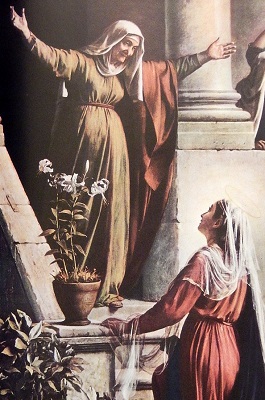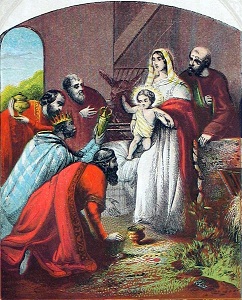Holy Mothers (and One Unholy Grandmother) –
Mary and Elizabeth
Luke 1:5-25, ElizabethLuke 1:26-56, Elizabeth and Mary
Luke 1:57-80, Elizabeth
Luke 2:1-24, Mary
Luke 2:25-51, Mary
John 2:1-5, Mary
Other Mothers
Copyright information, disclaimers, and sponsors
Return to homepage
Random Walk in a Gallery of Religious Art, Step 69: Luke 1:39-45, Mary and Elizabeth, by Carl Heinrich Bloch (9/4/15)
|
Years ago, at a baby shower for my daughter-in-law, two surprise visitors from far out of town were waiting for her when she arrived. She threw up her hands and shrieked with joy to see her parents! When an out-of-town relative or friend comes to my door unexpectedly, I typically throw up my hands and shriek “DAVID!!!! ” (or whatever name is appropriate – ha!). So this painting of Mary and Elizabeth, by Carl Heinrich Bloch, really speaks my language. Elizabeth had no warning that Mary was coming, and both she and her unborn child John were overjoyed. Previous Step. Next Step. |
 "Mary and Elizabeth" by Carl Heinrich Bloch, from the Gamble family Bible, now in the private collection of Regina Hunter. Click to enlarge. |
Luke 1:5-25, Elizabeth (7/24/2008)
It's entirely possible that there is nothing new to say or think about Mary and Elizabeth. So probably we will just review some ideas that we have thought about before. Elizabeth was from the tribe of Levi and the family of Aaron. All the Temple workers came from the tribe of Levi, and all the priests came from the part of Levi that was the family of Aaron. We know she married within the "family," because her husband Zechariah was a priest. This doesn't necessarily mean they were closely related – only that both descended from Aaron.
Elizabeth and her husband had no children, and she was called barren. Barrenness was always considered to be the woman's fault, because they didn't have a good grasp of physiology and genetics in ancient times. When it was Zechariah's turn to serve in the Temple, God sent Gabriel to announce the forthcoming birth of John, whom we know as John the Baptist. If Gabriel comes to you with a message, my advice is that you don't give him any backtalk, because he can be a bit short-tempered.
Luke 1:26-56, Elizabeth and Mary (7/25/2008)
Gabriel was a lot nicer to Mary than he was to Zechariah. When Zechariah questioned the message, Gabriel made him mute for 9 months. When Mary questioned the message, he just gave her an answer. I read a commentary once that said, "Mary's surprise comes as a surprise to us." He pointed out that she was betrothed, which was pretty close to being married (the man had to get a divorce if he decided not to get married, and the woman was a widow if he died before the wedding). Presumably she expected to have children. So why did she ask, "How am I going to have a child, being a virgin"? Well, presumably the regular way after she was married, just like Sarah, Samson's mother, and Elizabeth, all of whom found out from an angel that they would have a child.
I've read or heard this story at least once a year for practically my entire life, and it never occurred to me before I read that that her question is decidedly odd. Now, the commenter did not have an explanation for her question, and I don't have one either. The main reason I'm telling you this is that it pays to think about the scriptures you've heard all your life. Usually if you think about them and decide something is odd, there is a fairly standard explanation. And even when there isn't, we, like Mary, can try to discern what kind of message it might be.
Luke 1:57-80, Elizabeth (7/28/2008)
You know that our family does a lot of genealogy. Genealogists know that given names tend to run in families. (They also know that you never can tell. You would think "Minitree Jones" absolutely had to be named after an uncle, but you would be wrong – there were Minitrees everywhere in that county!) Apparently the custom of naming children after relatives is very old. When it came time to name Elizabeth and Zechariah's baby, she decided to call him "John." The neighbors' reaction was that no one in her family had that name, so they decided to ask Zechariah. Notice the amusing thing: he could hear fine, he just couldn't talk. Nevertheless, they made signs to him. (He was probably annoyed, just like any handicapped person today would be under the same circumstances.) Much to their surprise, he wrote a note to say that the baby's name was John. Immediately the binding put on him by Gabriel was lifted, and he prophesied that Elizabeth's baby would be a prophet of the Lord.
Luke 2:25-51, Mary (7/30/2008)
It's fun to talk about your kids with other parents, but the downside is that you have to listen to them talk about their kids, too. This is why I used to love Parent/Teacher Conferences. I could talk for 30 minutes with someone who was interested only in discussing my child. So I'm pretty confident that Mary and Joseph were all ears when they, poor as they were, came to the holy Temple in the Big City and discovered that a couple of people there wanted to talk about their baby. Furthermore, I can still quote some of the things that my children and grandchildren said when they were little. It's easy for me to imagine Luke sitting and listening to Mary as she told him exactly what people said about her baby, and exactly what her little boy had said to her. By the way, Luke emphasizes the Temple more heavily than the other gospel writers, so it's not surprising that he alone reports the events we read about today.
John 2:1-5, 12; Mark 3:31-35, 6:1-3; John 19:25-27; Acts 1:13-14, Mary (7/31/2008)
There's an email going around saying that you know Jesus was a Californian because he never cut his hair, went barefoot all the time, and founded a new religion. It also gives three reasons each why Jesus was Black, Irish, Italian, female, and Jewish. The "Jewish" part is an old joke: How do you know that Jesus was Jewish? Because he went into his Father's business, he lived at home until he was 33, and his mother thought he was God.
Obviously Mary knew that her son was no ordinary young man. At the wedding in Cana, she presents him with a problem, and even though he says he's not going to solve it, she knows better. She tells the servants privately to do whatever Jesus tells them to do. Later, the crowds around Jesus become so great that it's hard for her to get a chance to see him. When she and his brothers send in a message, he replies gently but firmly that he's busy. Nevertheless, the last action of his life is to ensure that Mary has a home with John, even though she has several other sons and daughters. And, just as we learned in the joke, she, not to mention his brothers, does come to know that he is God.
- Reader Question: In John 19:25, Mary is his mother and her sister is Mary also? I've never noticed that before. Your thoughts?
Response: As near as I can tell from commentaries, other people have had the same reaction as you. It isn't 100% agreed upon whether there were four women or three Marys––
Mary AND her sister AND Mary the wife of Clopas AND Mary Magdalene
or
Mary AND her sister Mary the wife of Clopas AND Mary Magdalene. This is John Wesley's position, and it seems to me to be an accurate reflection of the Greek in John. Probably the people who think John named four women (1) couldn't deal with sisters with the same name or (2) didn't read Greek.
In fact, what women were named varies between Mark and Matthew on the one hand and John on the other hand. Mark says "Mary Magdalene, and Mary the mother of James the younger and of Joses, and Salome." Matthew says "Mary Magdalene and Mary the mother of James and Joseph and the mother of the sons of Zebedee," which makes Salome the mother of James and John the sons of Zebedee. Luke just says "the women from Galilee." Is Mary the sister of Mary and wife of Clopas ALSO the mother of James and Joses? Who knows? And where is Mary the mother of Jesus in this account?
Now, as a genealogist, I have no trouble with two sisters of the same name. Prior to, say, our grandparents' generation, it was reasonably common to name a child after a deceased older child. It was not unheard of to give several children the same middle name, or to use the same name as a first name for one child and a middle name for another. I've seen families where all the boys had the same first name and different middle names, and even older tradition.
"Mary" was a very common name in first-century Palestine, and it wouldn't surprise me at all to learn that the girls were "Mary Elizabeth" and "Mary Anne" or some such combination. Of course, since it's not in any book we have, there's no way to learn it at this time.
Other Mothers
Sarah
Rebecca
Rachel and Leah
Miriam
Deborah
Ruth
Athaliah
Esther
The Four Most Important Women Who Never Lived
Women Who Expected Miracles
UMW in Bible Times
The color illustration showing the visit of the magi is from the family Bible of John O. Spencer and Lydia Bunn, married 18 Nov. 1857 in Hector, Schuyler Co., NY. A partial listing of the posted images from this Bible is given at Ducks in a Row, Inc.
Copyright 2008, 2011, 2015, 2021 by Regina L. Hunter. All rights reserved.
Opinions expressed on this page are solely those of the author, Regina Hunter, and may or may not be shared by the sponsors or the Bible-study participants. Thanks to the Holy Spirit for any useful ideas presented here, and thanks to all the readers for their support and enthusiasm. All errors are, of course, the sole responsibility of the author.
Our Sponsors:
St. John's United Methodist Church, "Transforming Lives Through Christ."
2626 Arizona NE, Albuquerque, New Mexico 87110
St. John's Music Ministries now has a YouTube channel, bringing you free concerts and choral music. Check it out!
Traditional worship services are held Sundays at 8:15 and 11:00 a.m. in the sanctuary. Casual worship services are held Sundays at 9:30 a.m. in the Family Life Center. Jazz Vespers are held monthly on the second Saturday at 5:00 p.m. in the sanctuary. St. John's feels especially called to the worship of God and to the service of our neighbors through our music program.
Storm Dragon SoftwareTM
Ducks in a Row, Inc.
This website is supported in part by the generosity of Mrs. J. Jordan.
